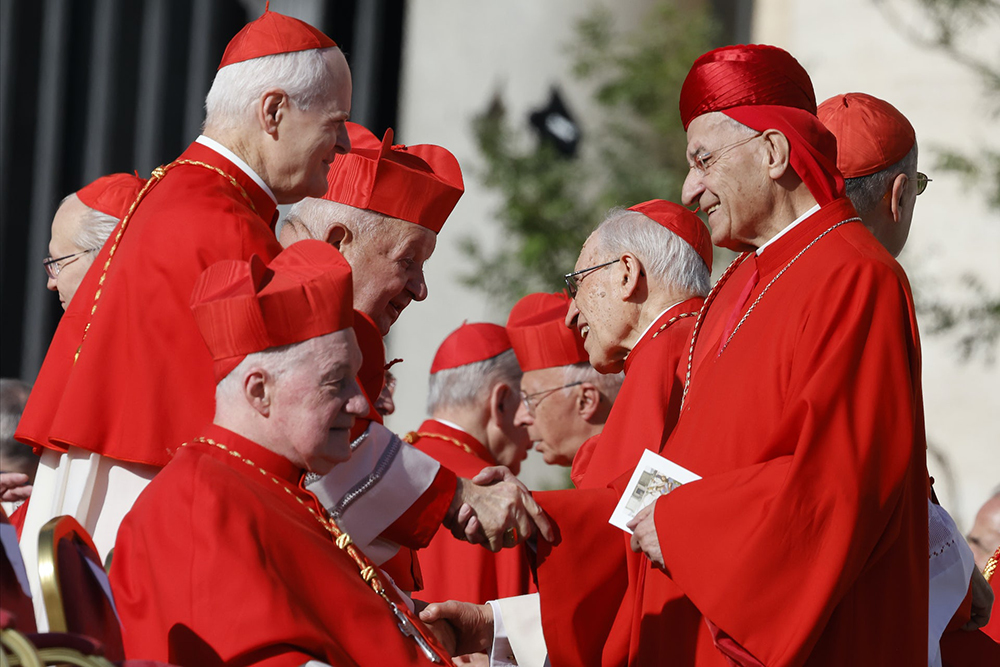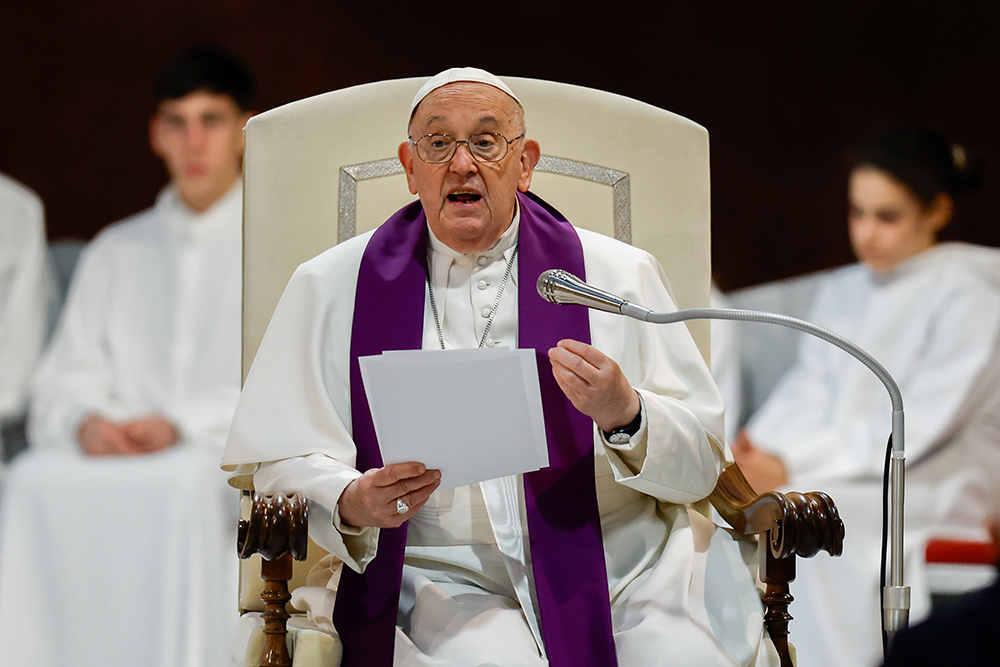
Cardinals interact during a consistory at St. Peter's Square at the Vatican on Sept. 30, 2023. (AP/Riccardo De Luca)
Before he retires or dies, Pope Francis needs to reform the process for choosing his successor because the current rules could result in a conclave deadlocked between a conservative and a liberal candidate.
The process for choosing a pope is not divinely inspired. It is a human creation that has changed over time and can change again.
The current system, in which cardinals elect a new leader by a two-thirds vote, has been firmly in place since 1179. Before that, popes were sometimes elected by the clergy and people of Rome. The conclave, in which the cardinals are held behind locked doors until a pope is elected, has been in place since the 13th century.
In the 20th century, the process was dramatically changed by the internationalization of the College of Cardinals. Italians no longer make up most of the electors. Pope Paul VI, who headed the church from 1963 to 1978, also increased the number of cardinals while limiting the electorate to cardinals under the age of 80.
Popes John Paul II and Benedict XVI made further changes with unintended consequences.
Advertisement
Traditionally, it has required a two-thirds vote to elect a pope in order to make sure that he had wide support within the church. If the leading contenders could not attract the required two-thirds, the electors were forced to find a compromise candidate who could.
In 1996, John Paul II revised the rules so that after 33 ballots, the two-thirds requirement could be suspended by a simple majority vote. If they could then give one candidate the same majority, they would have a new pope.
This change was made to avoid a hopelessly deadlocked conclave. The church does not want to be embarrassed like the Republicans in the House of Representatives who have had so much difficulty electing a speaker.
However, long conclaves are in fact rare. The last conclave to go more than five days was in 1831; it lasted 54 days. Since the 13th century, 29 conclaves have lasted a month or more, but the delays were often caused by wars or civil disturbances in Rome.
Under John Paul's system, the conclaves' dynamics changed dramatically. Once a candidate received a majority of the votes, his backers knew that if they stuck with him, he would eventually be elected. After waiting through 33 votes, they could vote to suspend the two-thirds requirement and elect him with their majority.
Some believe the rule was changed to make it easier to elect Cardinal Joseph Ratzinger, who was the leading papal candidate in 2005.
And indeed, once Cardinal Joseph Ratzinger got a majority vote, his supporters had no need to switch to a compromise candidate. Nor did his opponents have any chance of stopping him. Better to get it over with, vote for him and go home.
Some believe the rule was changed to make it easier to elect Cardinal Joseph Ratzinger, who was the leading papal candidate in 2005.
In 2007, Benedict returned to the hard and fast two-thirds supermajority. After 33 votes, however, the two top candidates would enter a runoff. This caused a new problem. A conclave deadlocked between a liberal and a conservative, both unacceptable to slightly more than a third of the cardinals, would have no choice but to pick one extreme or the other, with no option for a moderate compromise candidate.
Nor do the rules explain what to do if there is a tie for second place in the 33rd vote. In the absence of specific instructions, canon law would probably give it to the cardinal with greatest seniority, but the lack of a rule could blow up the conclave.
Francis should return to the traditional system of electing a pope by a two-thirds vote with no limit on the number of ballots. This would leave the door open for a compromise candidate in a deadlocked conclave.
Recently, a new reform proposal has been put forward by Alberto Melloni, a professor of church history at the University of Modena-Reggio Emilia. While the current electoral process pushes the cardinals to decide quickly, Melloni wants to slow the process down.
He argues that the election of a pope is too important to do quickly. Rather, the cardinals should take more time to pray and discuss the election. He would propose having only one vote a day, as opposed to the current practice of holding four votes a day.
While in the past, most cardinals lived in Rome and knew each other, today the cardinal electors are from all over the world and need time to get to know each other. This is especially true under Francis, who has rarely brought the cardinals together in Rome for a consistory, as John Paul did, to discuss issues facing the church.
Many cardinals are dependent on the media and other cardinals to tell them about the candidates. It would be better to give the cardinals more time before and during the conclave to get to know each other.
Melloni's proposal received a positive reception from Pillar's Ed Condon, a canon lawyer who takes a more conservative view of church matters.

Pope Francis gestures as he gives his homily during a Lenten penance service March 8, 2024, at the parish of St. Pius V in Rome. (CNS/Lola Gomez)
Granted the lack of long conclaves in recent history, I agree with Melloni that limiting the conclave to one vote a day would provide more time for prayer and discussion. It would be important, however, to clearly communicate to the media and the public that taking a week or two to elect a pope is the new normal and not a sign of chaos in the church.
I would even slightly modify Melloni's proposal by adding an additional vote each week the conclave is in session — one vote a day the first week; the second week, two votes a day; the third week, three votes a day; and finally, the fourth week would return to having four votes a day. We do not want the conclave to go on too long.
Others have suggested using procedures of the Synod on Synodality in the pre-conclave general congregations when the cardinals gather to discuss issues facing the church. This would include "conversations in the Spirit," with its emphasis on sharing and listening in small groups, rather than speeches by each cardinal. It might also involve non-cardinals, even laity, in discussing the issues facing the church. This would build consensus and mutual familiarity.
I am sympathetic to the new synodal procedures, but I believe it should be an option for the cardinals, rather than a mandate. The cardinal electors should be free to determine what process best meets their needs.
Providing the cardinals with more opportunities to get to know each other, both before and during the conclave, would reduce the danger that the cardinals could be swayed by fake news and videos created with artificial intelligence. Like U.S. elections, papal elections face threats from bad actors who want to manipulate the electors.
Already some in the church are doing "opposition research" on progressive cardinals with the idea of releasing negative information right before the conclave.
xAccusations of sexual activity, abuse or ignoring abuse, true or not, could kill a candidacy if amplified by social media just as the cardinals are entering the conclave and being cutoff from the outside world. Even if it was found to be fake news, the cardinals in the conclave would not know. They might pass over a good candidate rather than risk that the stories are true.
The purpose of isolating the cardinals from the outside world is to keep outsiders from influencing the election. But the same isolation could keep the cardinals from getting information they may need before deciding. The church needs to think about the threats that new technology may pose to papal elections.
Above all, Francis should move carefully, consult with experts, consider unintended consequences and issue a draft for discussion. John Paul and Benedict made mistakes because they did not consult widely. Francis should not make the same mistake.








